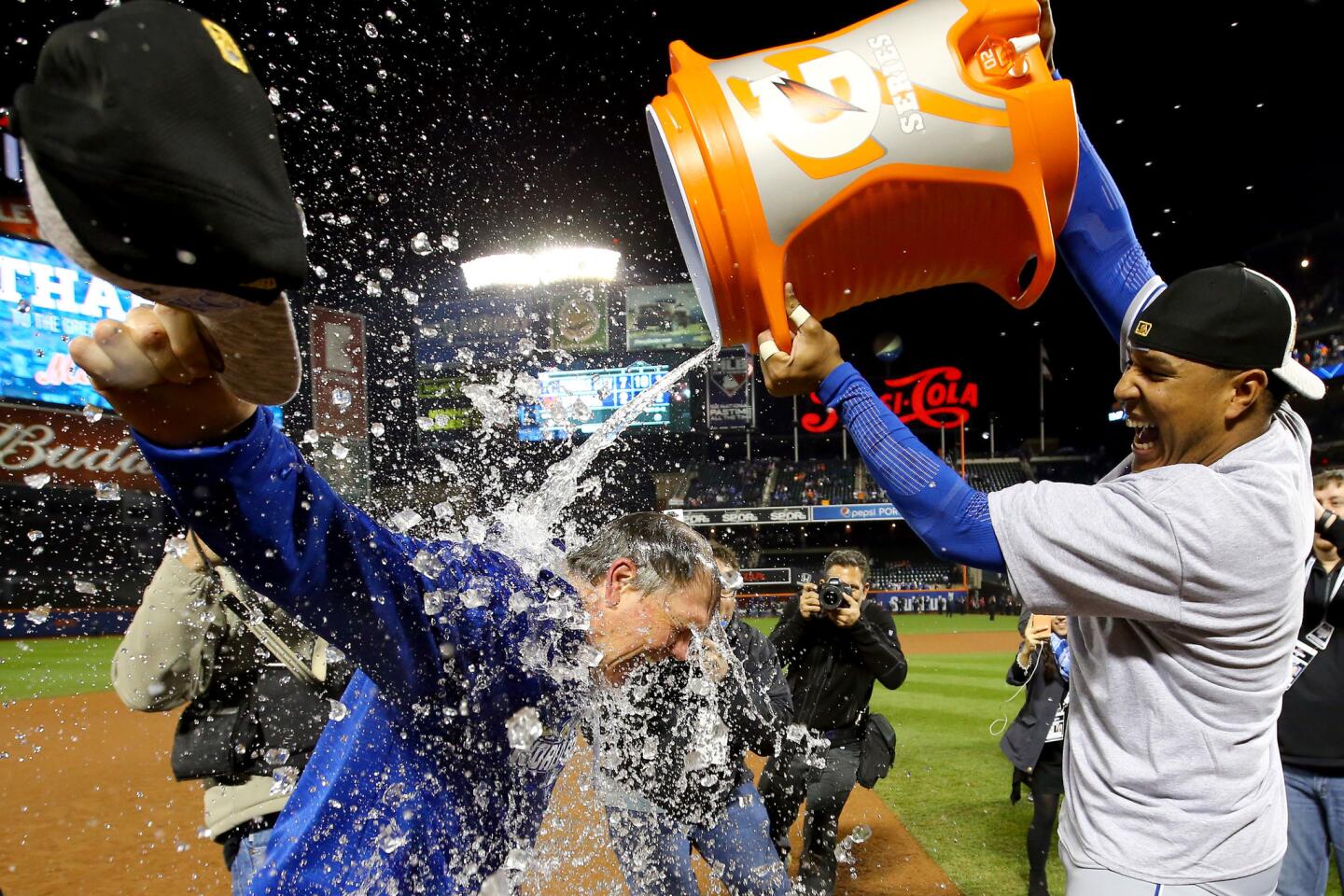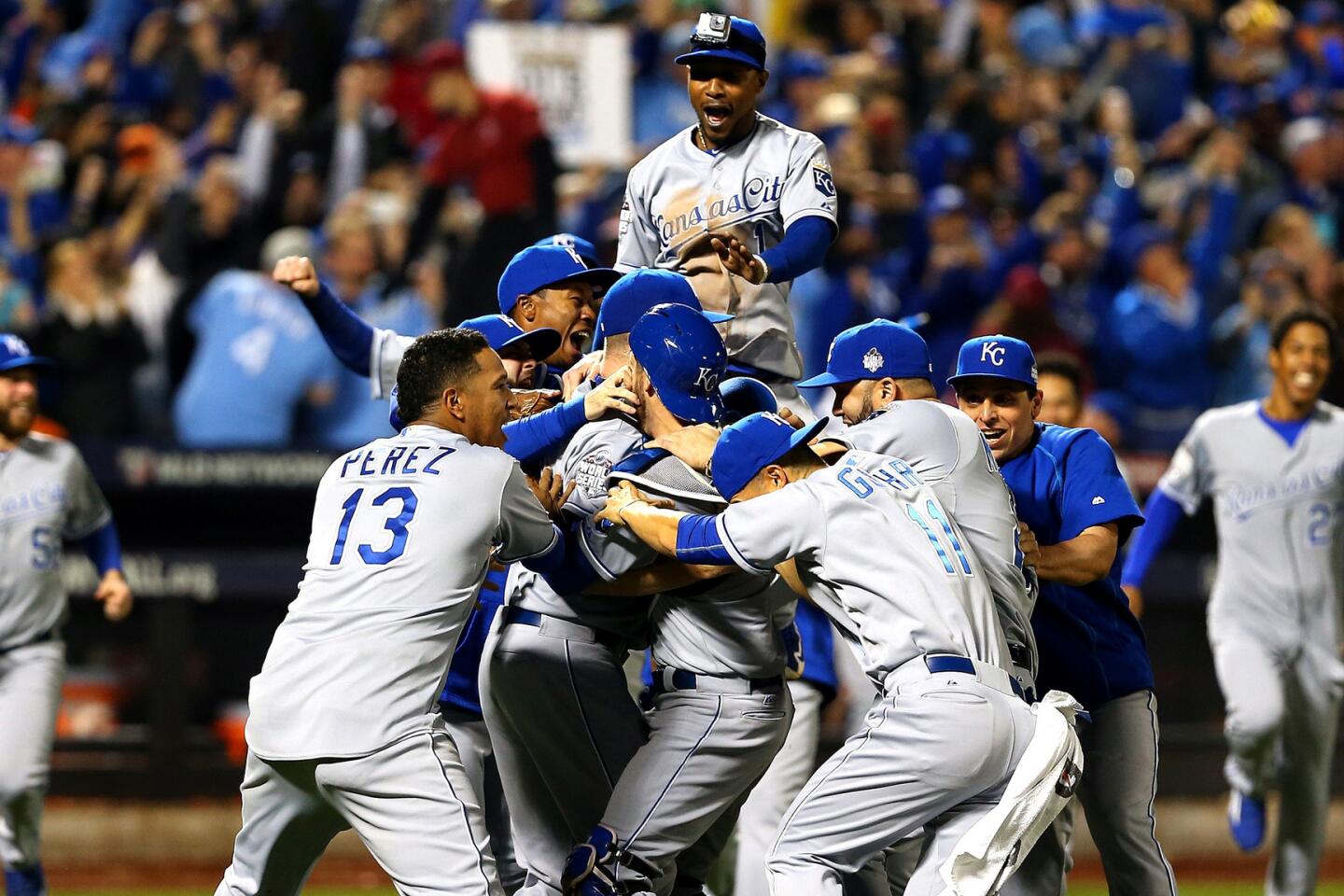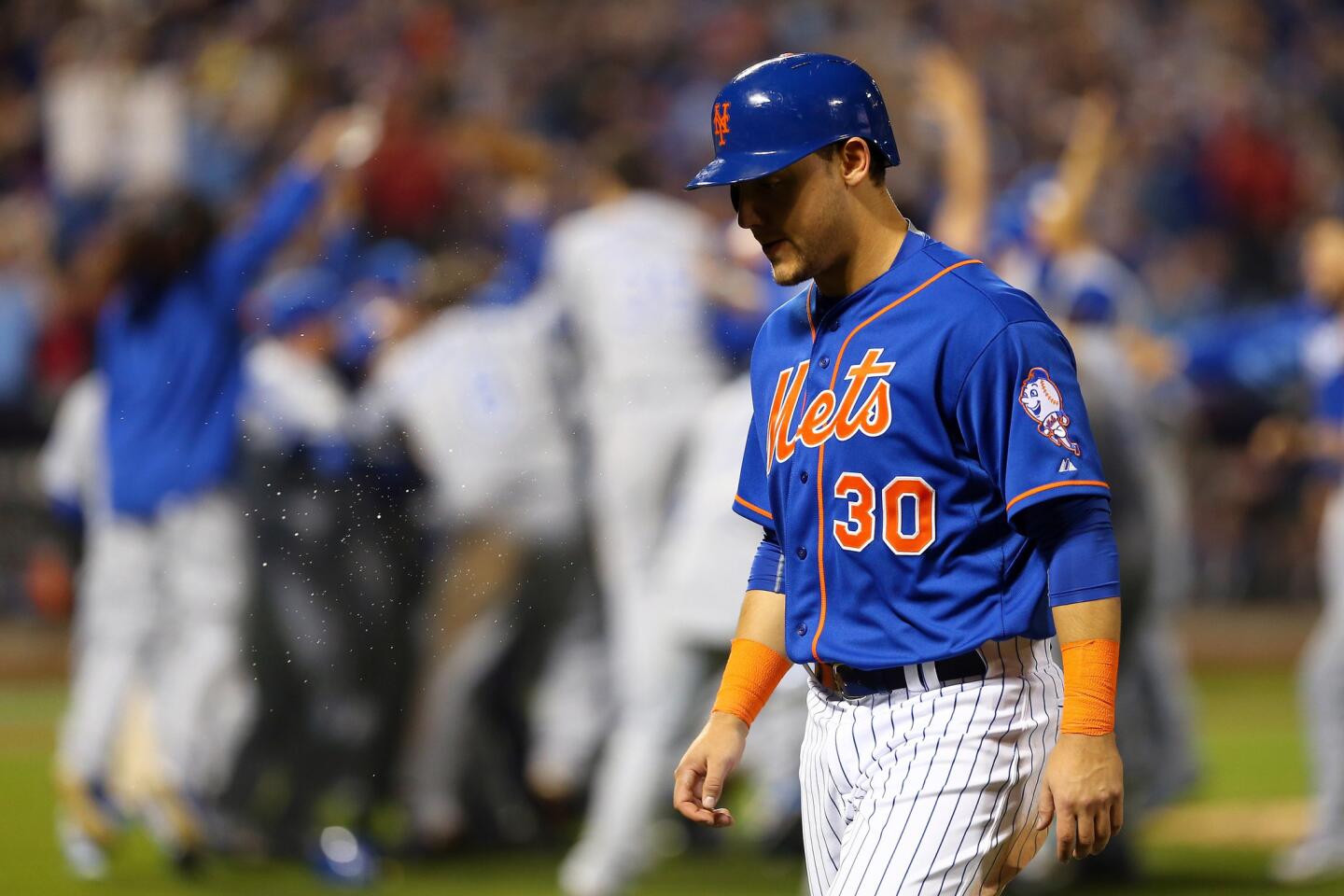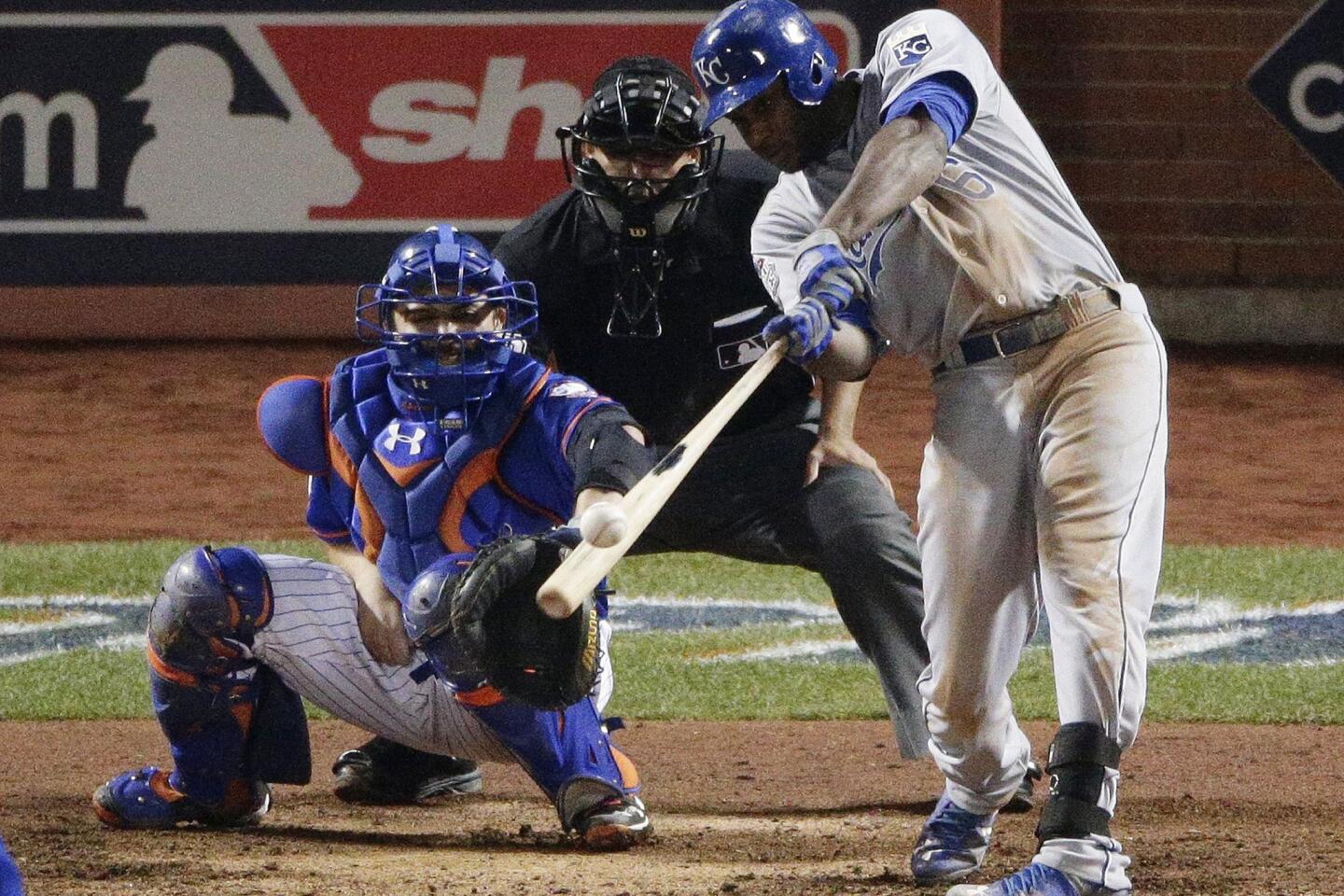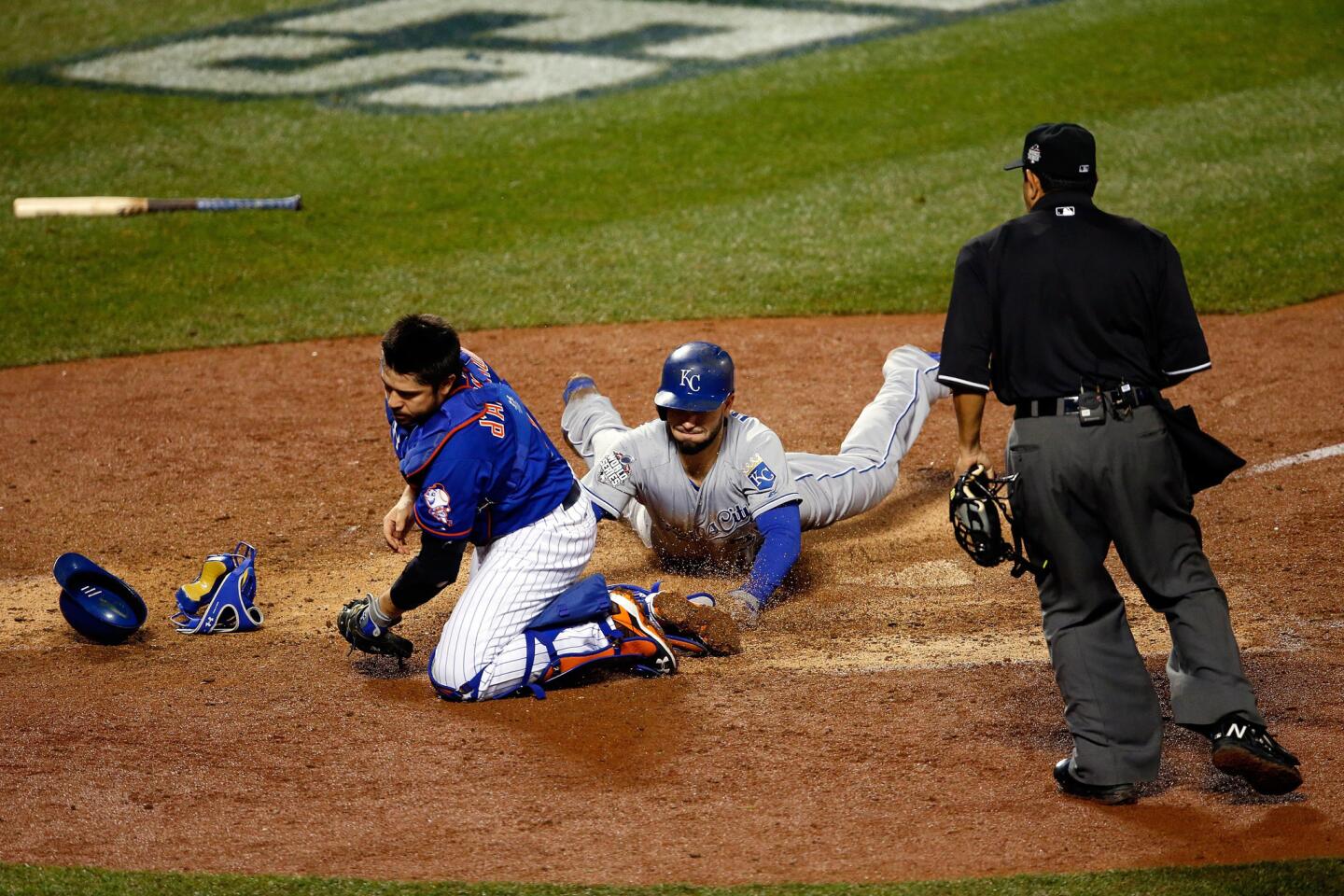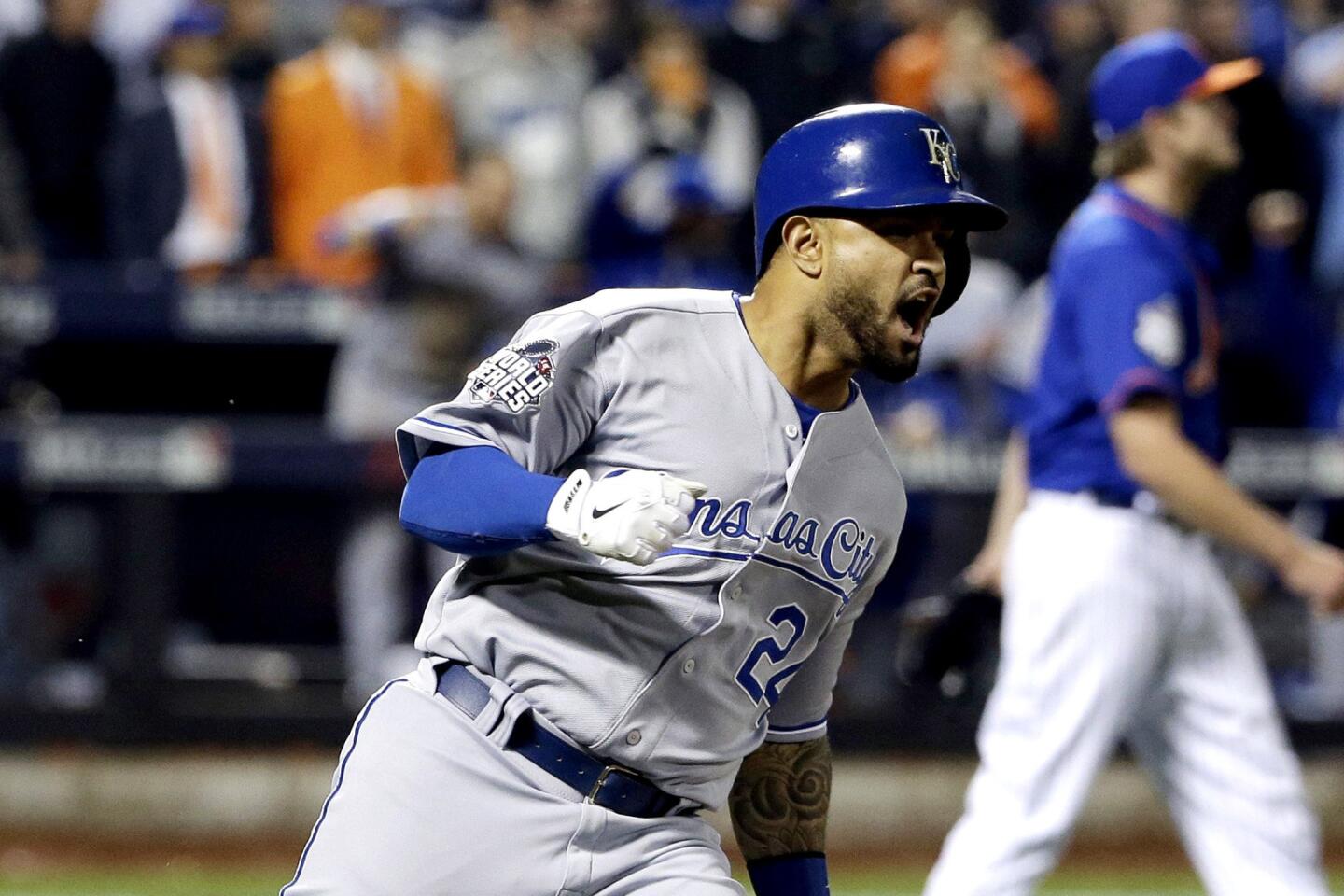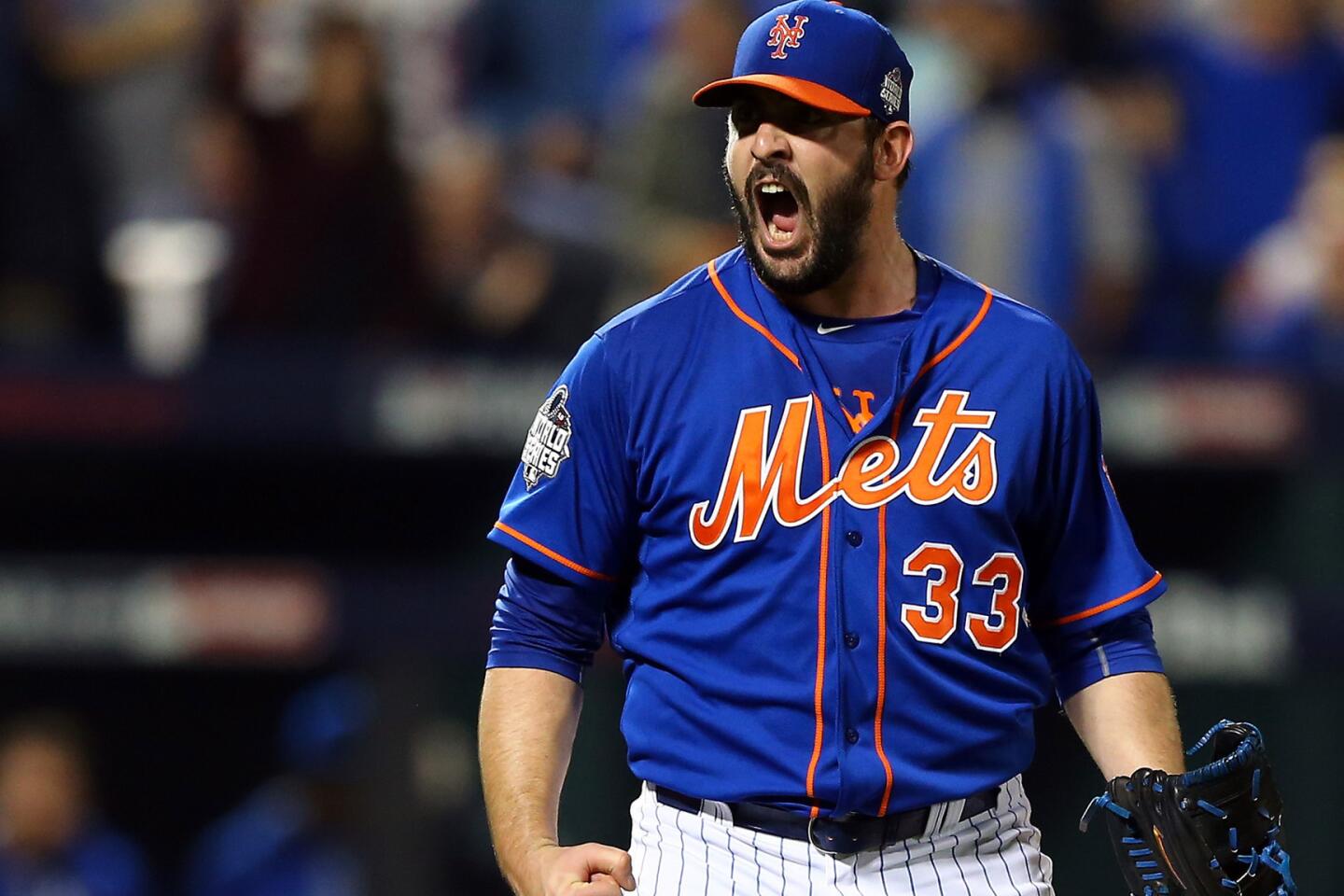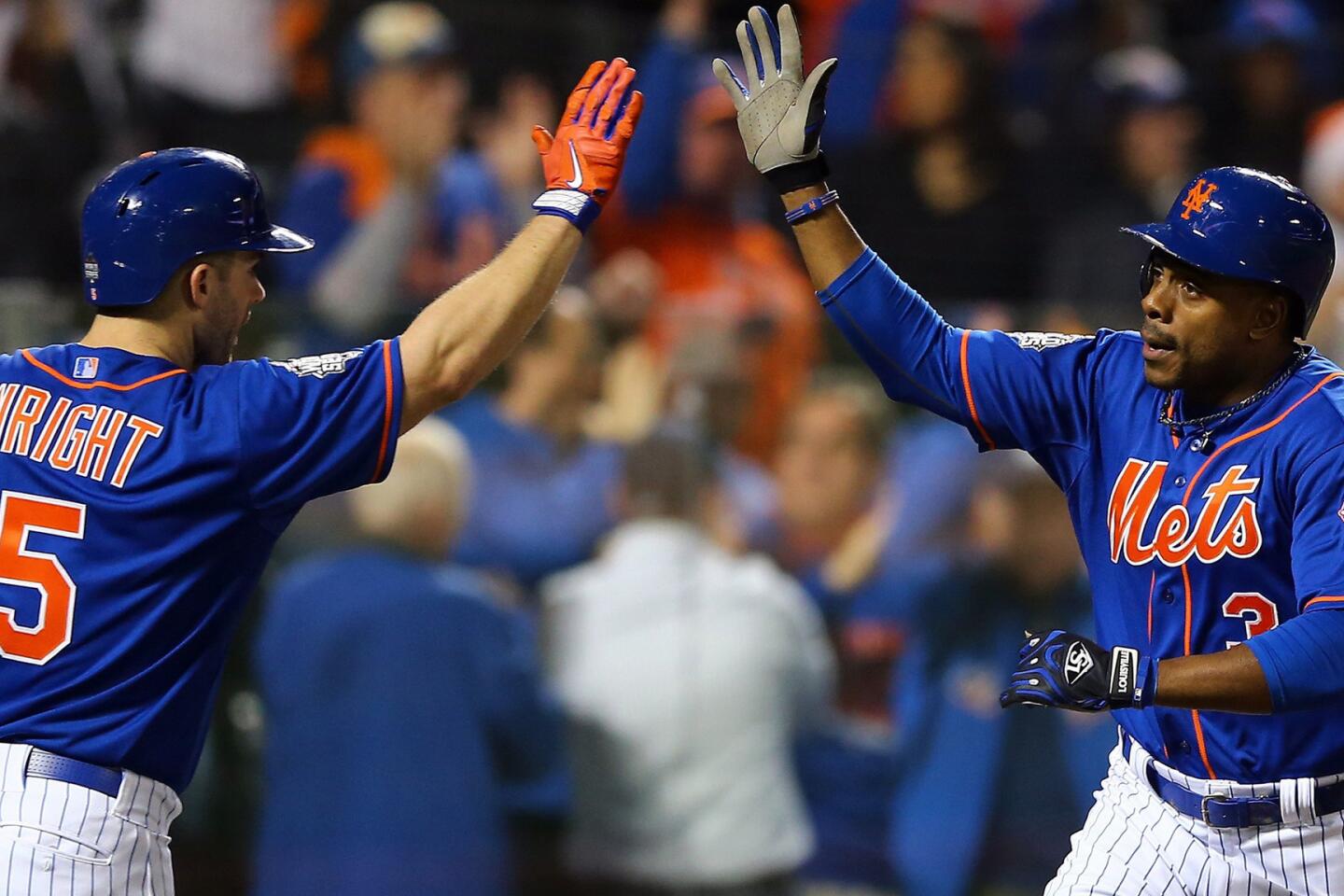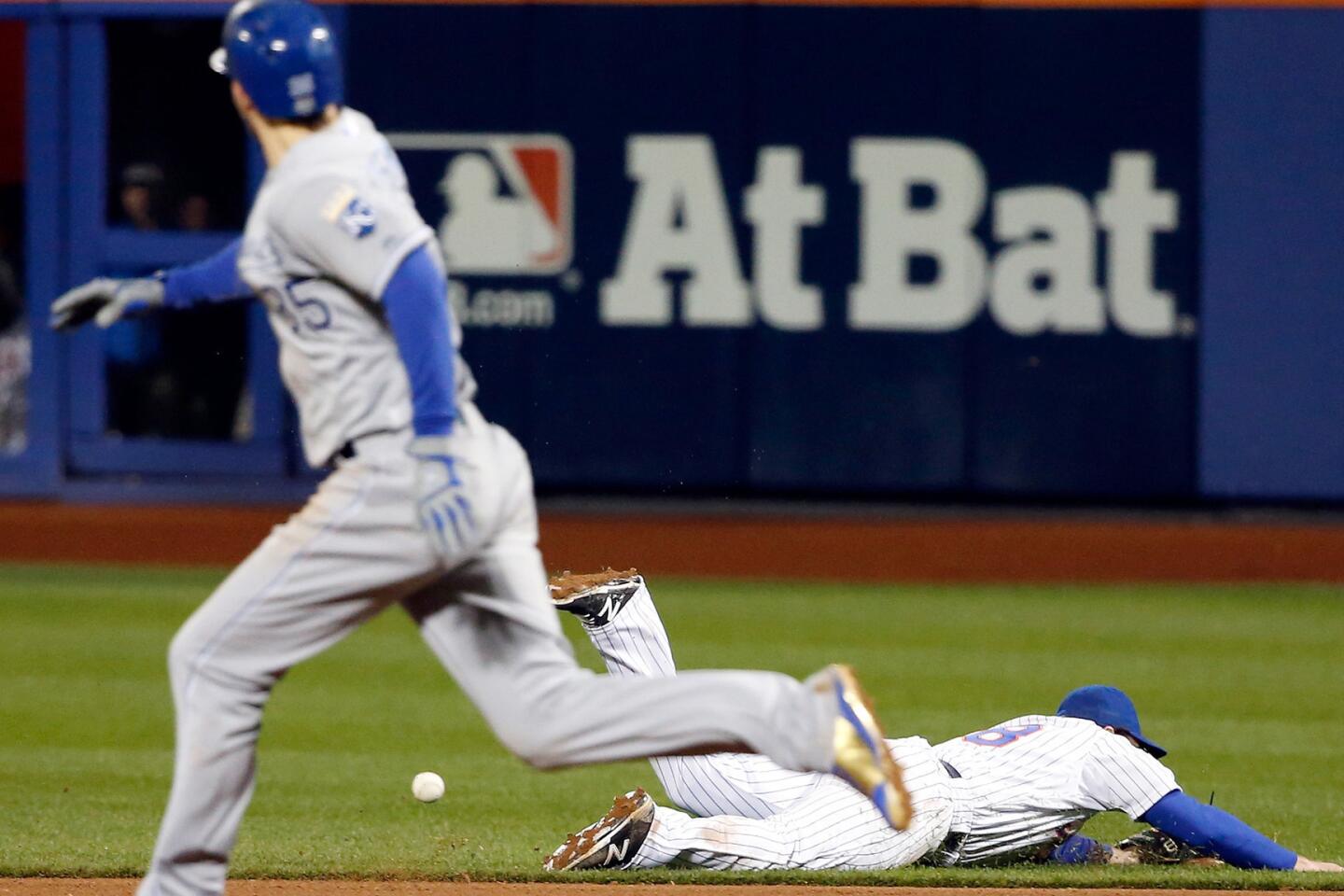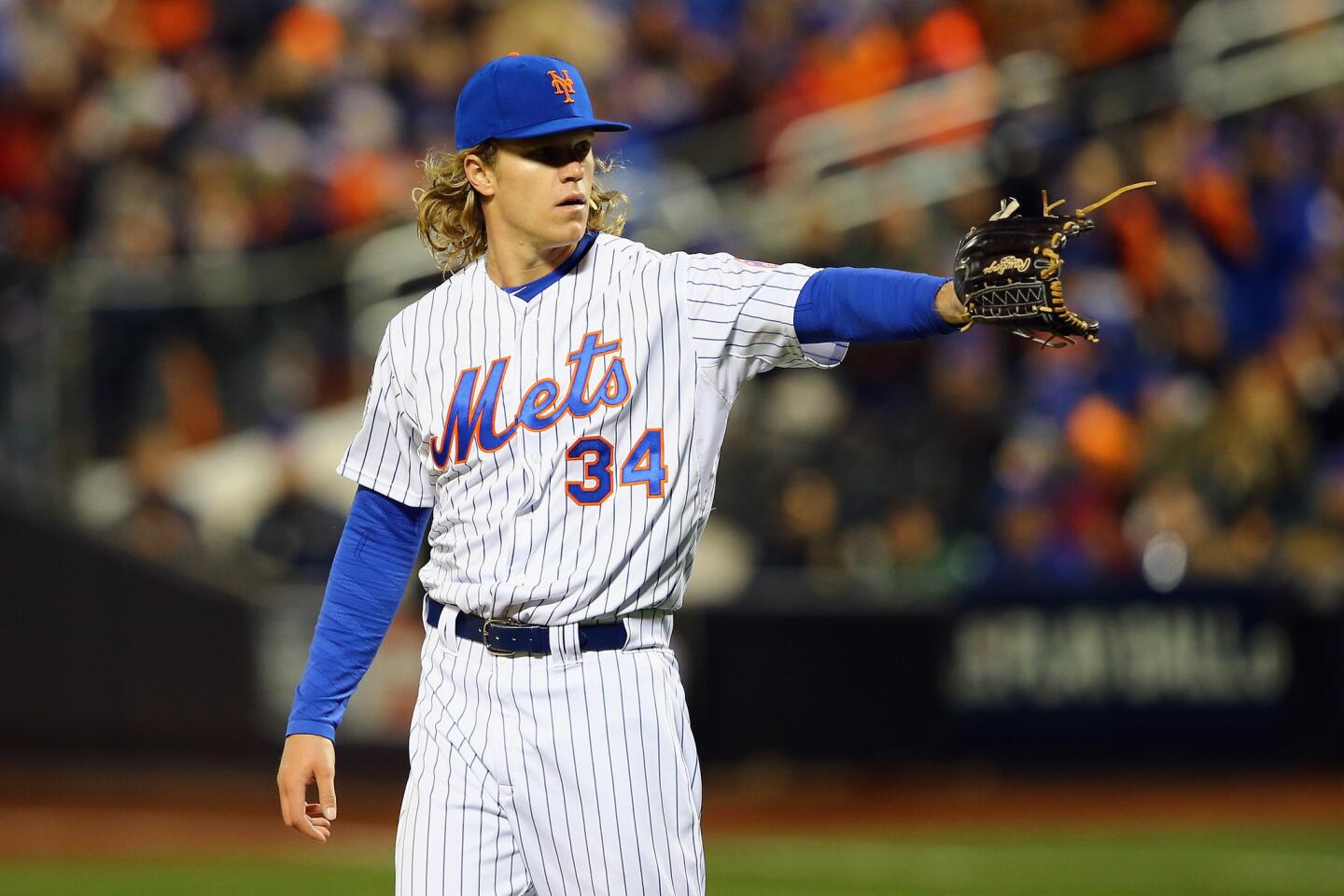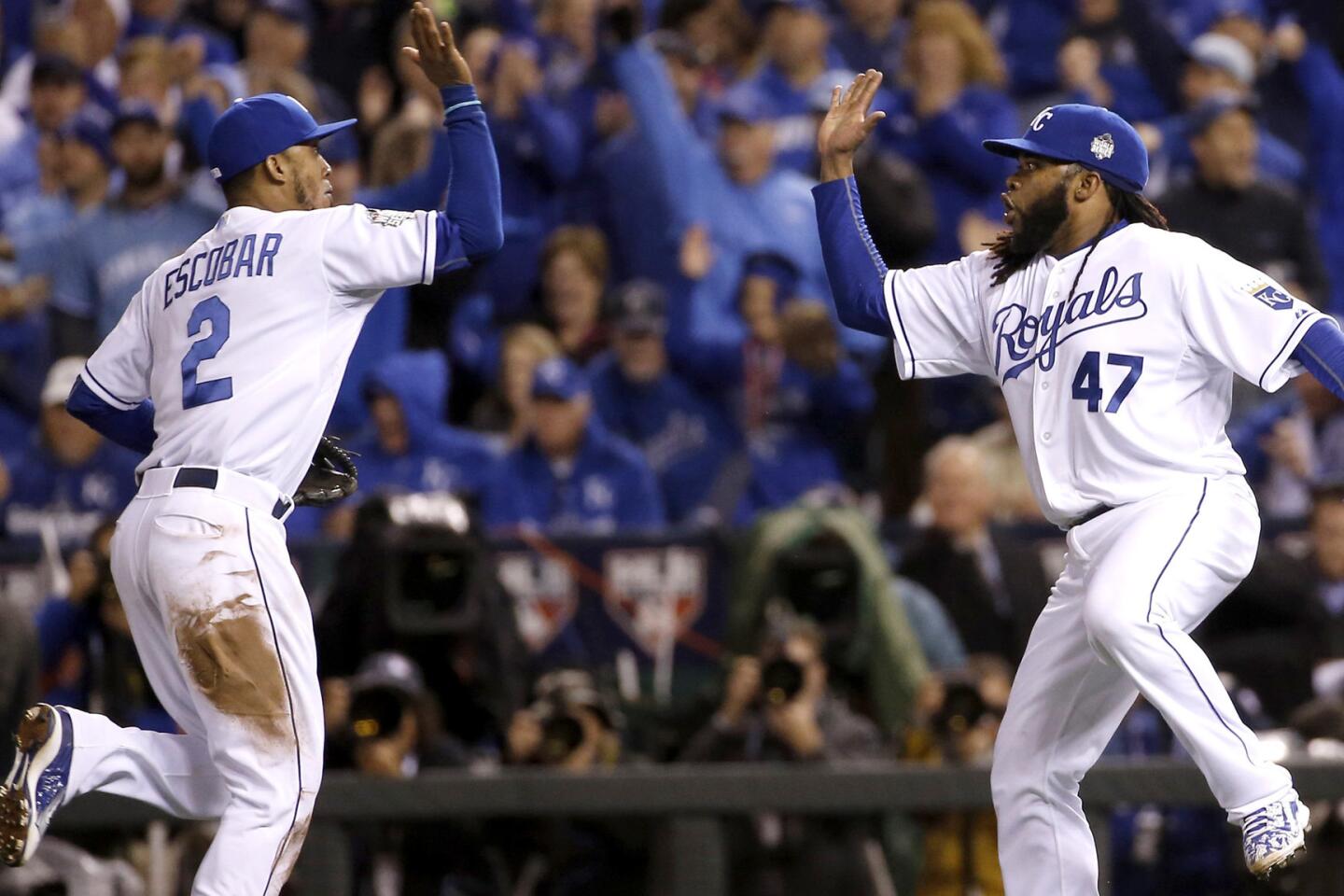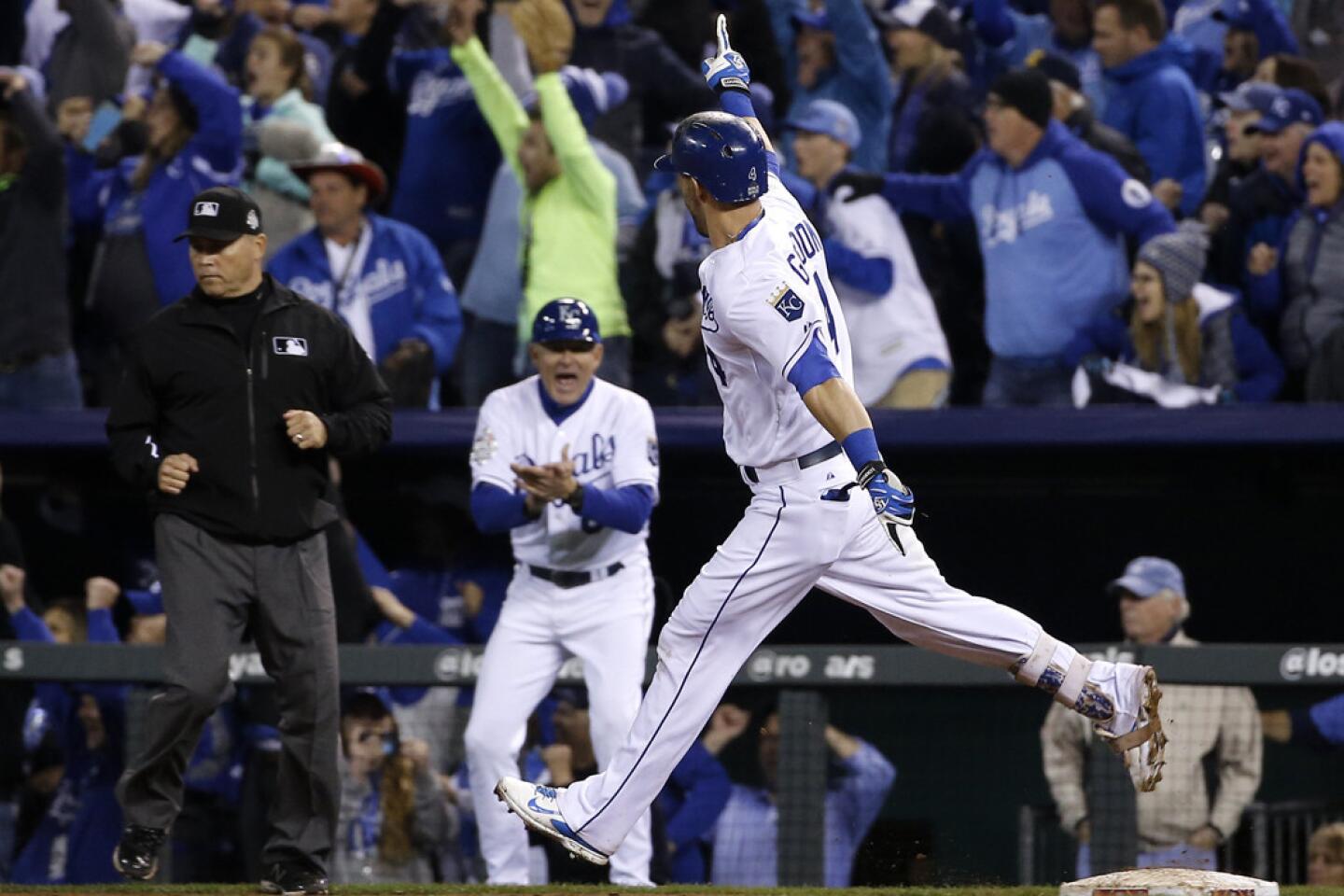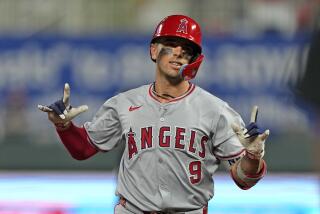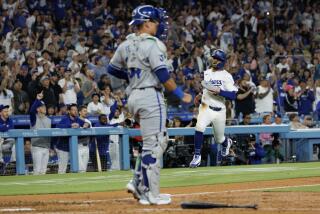World Series champion Kansas City Royals show it’s not all about the money
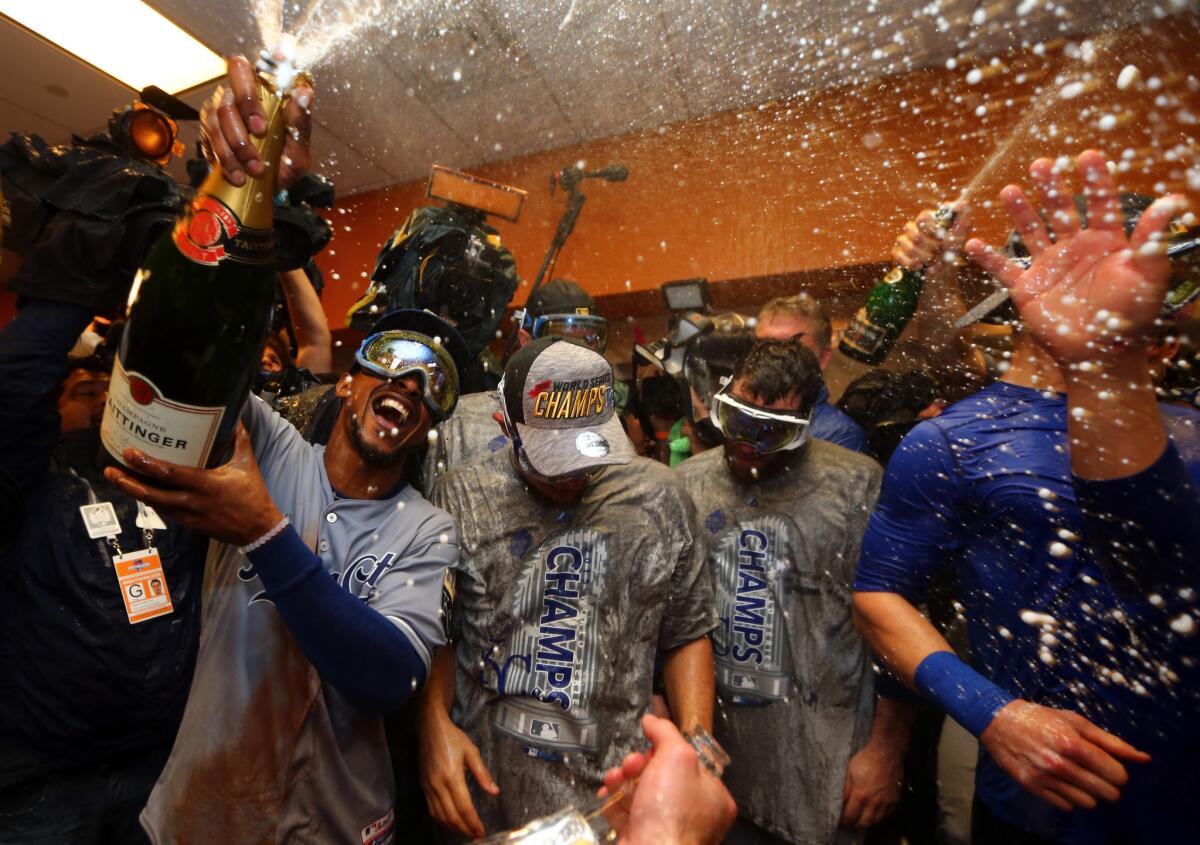
The Kansas City Royals celebrate in the clubhouse after defeating the Mets in Game 5 to win the 2015 World Series.
- Share via
Reporting from NEW YORK — The Kansas City Royals will cap their victory parade Tuesday with a rally outside Union Station, a majestic hall that dates to 1914. Time and commerce marched on, and by the middle of the 1990s, the station was abandoned, neglected and very nearly demolished.
Not too long ago, the Royals were in pretty bad shape themselves. Futility was becoming ingrained — 17 losing seasons in 18 years — and the Royals kept trotting out George Brett.
Union Station has been revived beautifully, and so have the Royals. Brett will ride in the parade Tuesday, proudly and happily, passing the baton of glory to Mike Moustakas and Eric Hosmer and Salvador Perez. No longer will the good fans of Kansas City need to squint at grainy images of Brett dressed in powder blue in order to see greatness on the diamond.
This is a great team, no doubt. The Royals won 95 games in the regular season. Their record in the postseason this year and last: 22-9 — including losses in the three games in which Madison Bumgarner appeared.
“We all kind of laughed when all the numbers came out predicting us to win 72 or 73 games,” Royals Manager Ned Yost said. “We just thought that was really funny.”
In the wake of the World Series, the tendency is to decipher the championship blueprint and suggest how it might be duplicated by other teams.
The Royals had their share of good fortune, and misfortune. From 2005-08, the Royals’ first-round picks were outfielder Alex Gordon, pitcher Luke Hochevar, Moustakas and Hosmer, in order. All were among the first three overall picks. The Royals got to draft so high because they lost 100 games in three consecutive seasons, 93 the next.
Teams throw millions of dollars at what can seem like millions of kids in Latin America. The Royals got Perez, the World Series MVP, for $65,000 and pitcher Yordano Ventura for $27,000. At those rates, a team is not so much projecting as hoping.
The Royals developed and deployed pitching depth, weathering the loss of two members of the starting rotation this season — the injured Jason Vargas and the ineffective Jeremy Guthrie — and trading three young pitchers to get star pitcher Johnny Cueto.
And when the Royals could not afford to retain pitcher James Shields, designated hitter Billy Butler and outfielder Nori Aoki from last year’s American League champions, they tread warily into free agency and gambled on Edinson Volquez, Kendrys Morales and Alex Rios as replacements. Total cost: $48 million, same as the Dodgers spent on Brandon McCarthy. The Royals went 3 for 3.
The Royals never have spent more than $55 million on a free agent. It went to pitcher Gil Meche, who honorably walked away from the final $12 million when his shoulder would not let him do his job. The Royals allocated some of those millions to sign their top prospect, shortstop Raul A. Mondesi, who made his major league debut in this year’s World Series.
That tired cliché of “it’s not about the money” rings at least somewhat true with regard to the Royals. For every dollar the Royals spent on their major league roster, the New York Yankees spent almost two, the Dodgers almost three.
“If you get good pitching and play defense, you’re going to win games,” Royals General Manager Dayton Moore said. “That’s how you tilt the field in your favor.”
The Royals and all their relentless hitting resemble the last championship team in Southern California, the 2002 Angels — except with better pitching, better defense and better baserunning. These Royals are entertaining to watch, much like those Angels.
The defining moment of this World Series was not a home run, not a strikeout. It was Hosmer making that mad dash for home plate, equal parts preparation from scouting reports and fortitude amid the pressure of the playoffs. Michael Conforto, the New York Mets’ rookie outfielder, had as many home runs in Game 4 as the Royals had in the entire series.
It would not be practical for every team to copy the Royals’ game plan of pitching, defense and speed, if only because that would devalue sluggers and tilt the field back toward what would be a shrinking number of power-hitting teams. But it would be nice if teams noticed that the Royals do not worship at the altar of the strikeout.
The rise in analytic findings that strikeouts for pitchers tend to predict success — a fielder can’t botch a ball if a batter never hits it — has correlated with the kind of velocity never before seen in baseball, where a 95-mph fastball has been reduced to “above average.” We may yet discover a link between all that velocity and all those elbow injuries.
In the meantime, strikeouts pile up, with batters urged to work the count and excused for striking out. The Royals hit the first pitch if they like it. They put the ball in play, they run rather than slug, and they force the other team to make plays, and sometimes mistakes. And as more teams adopt the cost-effective strategy of building a pitching staff from the bullpen first and working backward, running up a starter’s pitch count might not be as effective when the soft underbelly of middle relief has been hardened.
That kind of dissection can be left for another day, at least in Kansas City. This is a day to celebrate the revival of baseball there. The Royals, as it turns out, need not apologize for all those All-Stars. The Royals had the greatest rise in attendance of any team this season. They also had the best television ratings of any major league team. Of every five television sets on in Kansas City on Sunday, four were tuned to Game 5 of the World Series.
Bud Selig, baseball’s former commissioner, liked to talk about hope and faith. Once teams agreed to pool a fair amount of their revenue, he thought the economic playing field could be leveled to the point where hope and faith could be restored to the fan base of every team.
Money helps, of course, but it means little without patience from ownership and smarts from management.
The Royals play in the smallest market in the American League. They won the World Series, depriving every other team of whatever excuse it might care to offer, extending a beacon of hope and faith to forlorn fans across the land.
Twitter: @BillShaikin
MORE IN SPORTS:
Wondering if Clayton Kershaw will ever get World Series he deserves
Dodgers could learn from San Francisco Giants’ Mission Rock proposal
Clippers’ win over Suns is short on thrills but could be important later in rugged West
More to Read
Go beyond the scoreboard
Get the latest on L.A.'s teams in the daily Sports Report newsletter.
You may occasionally receive promotional content from the Los Angeles Times.

